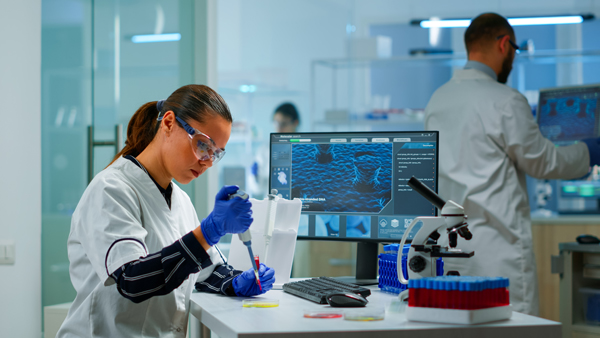
Understanding Cell Culture
14th March 2022
Cell culture is a routine procedure in tissue culture laboratories for growing cells and multiplying them. It is one of the crucial techniques in biology since it enables us to analyze a cell's biochemistry, physiology, and metabolism. Biotechnologists have an in-depth understanding of the process of cell culture and its function, but it can be tough to imagine the how and why of cell culture for the common man. In many ways, a cell culture process is similar to the needs of a baby. Yes, you read it correctly, a "BABY!"
Right from birth, everybody around an infant makes sure that the environment is hygienic and safe, away from anything that may harm the baby. The process of cell culture, in the same way, revolves around maintaining a sterile and clean environment in the laboratory. Newborns don't have a strong immune system, hence they are at risk of catching infections. While handling a baby we make sure that our hands are properly washed which is also the first step of cell culture. Before beginning any cell culture process, it is important to wash hands thoroughly and wear gloves while handling the workplace and equipment.
Another important responsibility of parents includes feeding the baby at regular intervals. Babies need to have adequate nutrients for proper growth and development. They are fed food that aids their overall function and health. In cell culture, nutrient media is added consistently to the culture which helps in keeping the cells healthy and viable. The nutrient media components are food to the cells that keep them nourished and grow better.
As the newborn takes up nutrients from its food, it excretes the unwanted materials out of its system. Parents change their diapers regularly to sustain hygiene around them. Similarly, over time toxins accumulate in the cell media, and nutrients are used up, hence cell media must be replenished at regular intervals.
Apart from food, several minerals and vitamins such as calcium and iron are also important for the baby's health. Babys are often kept in mild sunlight for a few minutes every day as it is considered one of the main sources of vitamin D and is helpful in elevating the serotonin levels inside the body. Similarly, multiple hormones and growth factors are added to the culture for the cells to develop efficiently.
In some cases, when a baby is born early, the preterm infant is placed inside an incubator by the doctors after its birth. This is because an incubator provides an ideal environment with a suitable temperature and the perfect amount of oxygen, humidity, and light. Cell culture involves a similar process of storing the cells inside a sterilized incubator with controlled environmental parameters like temperature, oxygen, humidity, and light.
Overall, the process of cell culture is all about nourishing the cells the right way and providing a proper environment for cell growth just like in the case of a newborn baby.

Clinical research photo created by DCStudio - www.freepik.com
Biocell® Copyright © 2026 All Rights Reserved.
Privacy Policy | Terms of Use
Biocell® products and services are offered by Regrow Biosciences Pvt. Ltd., directly or through authorized franchisees only. All payments must be made exclusively to Regrow Biosciences Pvt. Ltd. For verification, call +91 75069 4135. Thank you for your attention.
Biocell® Copyright © 2020
All Rights Reserved.
Biocell® products and services are offered by Regrow Biosciences Pvt. Ltd., directly or through authorized franchisees only. All payments must be made exclusively to Regrow Biosciences Pvt. Ltd. For verification, call +91 75069 4135. Thank you for your attention.
Download Brochure
Submitting...please wait. You will be redirected to the download page.